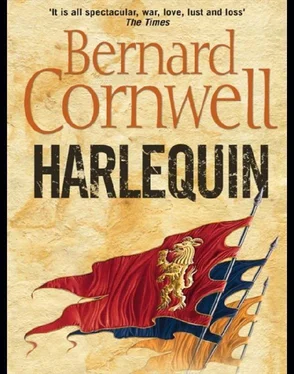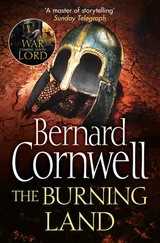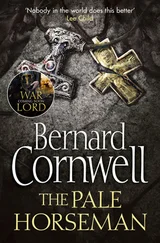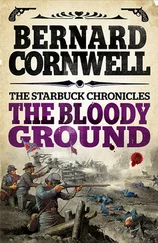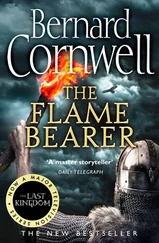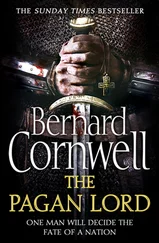Lances were unwrapped. They had been carried on packhorses or wagons and had hardly been used in the campaign, but the knights all dreamed of a proper battle of swirling horsemen punctu-ated by the shock of lances striking shields. The older and wiser men knew they would fight on foot and that their weapons would mostly be swords or axes or falchions, but still the painted lances were taken from their cloth or leather coverings that protected them from being dried by the sun or warped by rain. We can use them as pikes," the Earl of Northampton suggested.
Squires and pages armed their knights, helping them with the heavy coats of leather, mail and plate. Straps were buckled tight. Destriers were brushed with straw while the smiths dragged sharp-ening stones down the swords" long blades. The King, who had begun arming himself at four in the morning, knelt and kissed a reliquary which contained a feather from the wing of the angel Gabriel and, when he had crossed himself, told the priest to carry the reliquary to his son. Then, with a golden crown surrounding his helmet, he was helped up onto a grey mare and rode north from the village.
It was dawn and the ridge between the two villages was empty. The mill, its linen sails neatly furled and tethered, creaked in the wind that stirred the long grasses where hares grazed but now cocked their ears and raced away as the horsemen climbed the track to the mill.
The King led, mounted on the mare that was swathed in a trapper bright with the royal arms. The scabbard of his sword was red velvet and encrusted with golden fleur-de-lis, while the hilt was decorated with a dozen great rubies. He carried a long white staff and had brought a dozen companions and a score of knights as escorts, but as his companions were all great lords then they were duly followed by their entourages so that close to three hundred men trailed up the winding track. The higher a man's rank, the closer he rode to the King, while the pages and squires were at the back where they tried to hear the conversation of their betters.
A man-at-arms dismounted and went into the mill. He climbed the ladders, opened the small door that gave access to the sails and there straddled the axle as he peered eastwards.
See anything?" the King called up cheerfully, but the man was so overcome by being addressed by his king that he could only shake his head dumbly.
The sky was half covered in clouds and the country looked dark. From the mill's height the man-at-arms could see down the long slope to the small fields at its foot, then up another slope to a wood. An empty road ran eastwards beyond the wood. The river, filled with English horses being watered, twisted grey on the right to mark the forest's edge. The King, his visor jammed up against the crown's frontal, stared at the same view. A local man, discovered hiding in the forest, had confirmed that the road from Abbeville came from the east, which meant that the French must cross the small fields at the foot of the slope if they were to make a frontal attack on the hill. The fields had no hedges, merely shallow ditches that would offer no obstacle to a mounted knight.
If I was Philip,“ the Earl of Northampton suggested, I'd ride round our north flank, sire.”
You're not Philip, and I thank God you're not,“ Edward of Eng-land said. He's not clever.” And I am?" The Earl sounded surprised.
You are clever at war, William,“ the King said. He stared down the slope for a long time. If I was Philip,” he said at last, I would be mightily tempted by those fields,“ he pointed to the foot of the slope, especially if I saw our men waiting on this hill.” The long green slope of the open pastureland was perfect for a cavalry charge. It was an invitation for lances and glory, a place made by God for the lords of France to tear an impudent enemy to ragged shreds.
The hill's steep, sire,“ the Earl of Warwick warned. I warrant it won't look so from the foot,” the King said, then turned his horse and spurred northwards along the ridge. The mare trotted easily, revelling in the morning air. She's Spanish,“ the King told the Earl, bought off Grindley. D'you use him?” If I can afford his prices."
Of course you can, William! A rich man like you? I'll breed her. She might make fine destriers."
If she does, sire, I'll buy one from you."
If you can't afford Grindley's prices,“ the King teased, how will you pay mine?”
He spurred the mare into a canter, his plate armour clanking, and the long train of men hurried after him along the track which led north on the ridge's summit. Green shoots of wheat and barley, doomed to die in the winter, grew where the grains had fallen from the carts carrying the harvest to the mill. The King stopped at the ridge's end, just above the village of Wadicourt, and stared northwards. His cousin was right, he thought. Philip should march into that empty countryside and cut him off from Flanders. The French, if they did but know it, were the masters here. Their army was larger, their men fresher and they could dance rings about their tired enemy until the English were forced to a desperate attack or were trapped in a place that offered them no advantage. But Edward knew better than to let every fear prey on his mind. The French were also desperate. They had suffered the humiliation of watching an enemy army wreak havoc across their land and they were in no mood to be clever. They wanted revenge. Offer them a chance, he reckoned, and the odds were good that they would snatch at it, and so the King dismissed his fears and rode down into the village of Wadicourt. A handful of the villagers had dared to stay and those folk, seeing the golden crown encircling the King's helmet and the silver curb chains on his mare, went onto their knees. We mean you no harm,“ the King called airily, but by morning's end, he knew, their houses would have been ransacked thoroughly. He turned southwards again, riding along the ground at the foot of the ridge. The valley's turf was soft, but not treacherous. A horse would not flounder here, a charge would be possible and, better still, just as he had reckoned, the hill did not look so steep from this angle. It was deceptive. The long stretch of rising grass looked gentle even, though in truth it would sap the horses” lungs by the time they reached the English men-at-arms. If they ever did reach them.
How many arrows do we have?“ he asked every man in earshot. Twelve hundred sheaves,” the Bishop of Durham said. Two carts full," the Earl of Warwick answered.
Eight hundred and sixty sheaves,“ the Earl of Northampton said. There was silence for a while. The men have some themselves?” the King asked.
Perhaps a sheaf apiece,“ the Earl of Northampton said gloomily. It will just have to be enough,” the King said bleakly. He would have liked twice as many arrows, but then he would have liked a lot of things. He could have wished for twice as many men and a hill twice as steep and an enemy led by a man twice as nervous as Philip of Valois who, God knows, was nervous enough anyway, but it was no good wishing. He had to fight and win. He frowned at the southern end of the ridge where it fell away to the village of Crecy. That would be the easiest place for the French to attack, and the closest too, which meant the fight would be hard there. Guns, William,“ he said to the Earl of Northampton. Guns, sire?”
We'll have the guns on the flanks. Bloody things have to be useful some time!"
We could roll the things down the hill, sire, perhaps? Maybe crush a man or two?"
The King laughed and rode on. Looks like rain.“ It should hold off a while,” the Earl of Warwick answered. And the French may hold off too, sire."
You think they won't come, William?"
The Earl shook his head. They'll come, sire, but it'll take them time. A lot of time. We might see their vanguard by noon, but their rearguard will still be crossing the bridge in Abbeville. I'll wager they'll wait till tomorrow morning to make a fight.“ Today or tomorrow,” the King said carelessly, it's all the same.“ We could march on,” the Earl of Warwick suggested. And find a better hill?" The King smiled. He was younger and less experienced than many of the earls, but he was also the King and so the decision must rest with him. He was, in truth, filled with doubts, but knew that he must look confident. He would fight here. He said as much and said it firmly.
Читать дальше
Конец ознакомительного отрывка
Купить книгу
